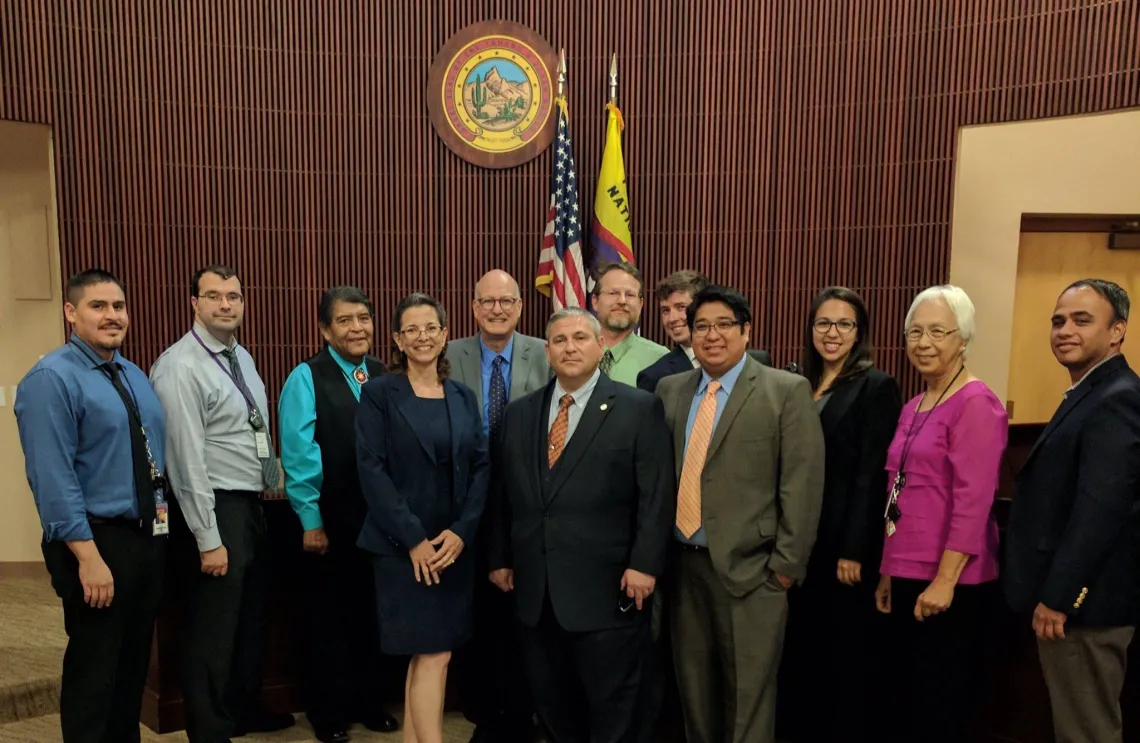
Students enrolled in the Indigenous Peoples Law and Policy program’s Tribal Justice Clinic provide legal assistance to tribes throughout the Southwest, North America, and the world. Students serve as tribal judicial clerks, write amicus briefs, develop legal strategies, and work beside criminal defenders and tribal prosecutors in courtroom settings. They contribute to important tribal justice projects, researching best practices, drafting legislation, and developing tribal codes.
Students research legal issues and help try cases in support of tribal efforts to improve the administration of justice and good governance in Indian Country. The Tribal Justice Clinic gives students vital experience working with tribal communities on emerging legal and policy issues, preparing them as lawyers to enter the field with practical experience and established relationships with community leaders.
A new student practice rule adopted by the Pascua Yaqui Tribal Court allows students enrolled in the Tribal Justice Clinic to appear in court under the supervision of a licensed attorney. This new rule allows clinic students to appear in tribal court and argue cases. The Tribal Justice Clinic affords students the chance to gain vital court room skills, work with leading legal practitioners, and increase access to justice for Yaqui community members.
Clinic Projects
Students have been involved in legal research and advocacy on the following important and timely topics facing Indigenous peoples across the United States including the Violence Against Women Act, the Indian Child Welfare Act, disenrollment, and many more. Students working in the clinic have:
- Drafted model jury instructions for a local tribe now applying VAWA criminal jurisdiction
- Wrote and filed an amicus brief with the United States Supreme Court in the Aguayo v. Jewell case on behalf of 63 tribal members who were disenrolled after the tribe, using a questionable process, redefined the amount of Indian blood required for membership
- Provided Indian law research for a Native American woman now facing execution for four homicides occurring on a California Rancheria
- Provided legal research for an Arizona tribe filing a brief in a far-reaching challenge to the Indian Child Welfare Act
- Wrote a student practice rule for a local tribe so that future clinic students can appear as advocates in tribal court
- Drafted a model code of ethics for attorneys and advocates appearing in an Arizona tribal court
- Provided legal research for a local tribe now applying VAWA criminal jurisdiction about how to manage confidential personal criminal records and other data
- Wrote a bench book for tribal court judges for use in conducting VAWA probable cause hearings
- Provided a legal research update for a gaming tribe on the most recent developments in the law
Practical Experience
Students gain practical experience in criminal law, civil litigation and procedure, and trial advocacy within tribal court settings.
The Tribal Justice Clinic gives students vital experience:
- Working with tribal communities on emerging legal and policy issues
- Gaining trial advocacy skills for clients in tribal court systems
- Advocating for justice within tribal communities
- Researching critical issues in federal Indian law
- Establishing relationships with community leaders
If you are an attorney working with tribes in southern Arizona, here are some useful resources.
Pascua Yaqui Tribal Court: http://www.pycourts.org/
Pascua Yaqui Attorney Certification: http://www.pycourts.org/bar-association/pascua-yaqui-tribal-court-certification
Tohono O’odham Tribal Court: https://tojc-nsn.gov/rules-and-opinions
Tribal Court Clearinghouse: http://www.tribal-institute.org/
Turtle Talk: https://turtletalk.wordpress.com/
